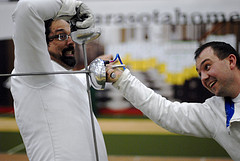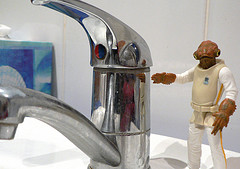
Debating
Like most sports, I’m not much good at debate. I say it’s a sport because it’s a competition with a winner and loser where the participants’ skills have the largest bearing on the outcome.
I think that most people casually lump debate and argument into the same mental bin; if not as exact synonyms, then as different degrees of the same thing. But they are really quite different! A debate has almost nothing to do with logic or the correctness of stated facts, but these things are crucial to the outcome of an argument.

Adversarial collaboration
In an argument, the two sides start with differing opinions or understandings about a topic. Well-conducted arguments can get very pedantic and take a long time to conclude. Sometimes the facts needed to decide an argument aren’t available. Although they can get heated with emotion, at the end of a good argument both sides should depart with the same understanding, reached by applying logic to the available facts.
Arguments are a great way to battle cognitive bias! It’s a system of informal collaboration: each participant tries to find the logical or factual flaws that the opposing side is laboring under, and point them out. Unlike a debate, this process has nothing to do with ego, wit, or the invocation of clever but misleading fallacies. The goal of an argument is not to win, but rather to be (or become) correct. This is a subtle but extremely important distinction.
As a skeptic, I love to argue. I love to be right and convince someone else of it, and I also love to be proven wrong and thereby learn.

It’s a trap! (sometimes)
When you’re in an argument, you have to be vigilant for signs of “impedance mismatch”, i.e. an argument conducted in bad faith– If only one side is interested in arguing but the other side moves into debating then the the progress and outcome of the discussion will be of undefined significance. Just as if one person is figure skating and the opposing side suddenly switches to ice hockey.. nothing meaningful can be said about the results except it won’t end well.
If the debating party is clever, they can very easily prevail over the arguing party. Attractive, unsupported claims can be made quickly so the debater stays on the offensive. They can weave straw men and ask questions that don’t have snappy answers. If the opponent is able to keep up, the debater can arbitrarily move the goalposts. The arguer quickly gets mired down, spending time to refute or reason through even a small portion of the claims.
Citing that your opponent is not being truthful and flagging their fallacies doesn’t win debates. This is why those with logically inconsistent (or unsupportable) viewpoints love to debate, especially against scientists and critical thinkers. It gives them the chance to win without being right! By selecting an opponent who is beholden to logic and really wants to change the other’s mind, the debater is practically assured victory. Even if the quarry detects the trap and switches to debate tactics, the attacker can force a stalemate by pointing out the logician’s hypocrisy for using fallacies!

What to do
If you are a critical thinker and you love to debate, then dive in, be ruthless, and take no prisoners! Don’t go to the dark side, though; be ever vigilant in checking your cognitive bias. Winning debates doesn’t make your position correct.
If you are like me, argumentative but more interested in truth than victory, then surround yourself with like-minded people. If you find your positions challenged aggressively it can be an ego hit to defuse a debate instead of meeting it head on. But it’s nothing like getting sucked into a trap when you’re unprepared; losing the debate despite being right.
4 responses to “Argument > Debate”
[…] is a great short podcast on how to argue that talks about a lot of the same points I made earlier. It goes into additional detail about how to prepare and conduct arguments so that everyone […]
[…] is on your side. It’s counter-intuitive on first consideration, but as I’ve mused previously, debating has relatively little to do with truth and mostly pivots on charisma and debate tactics […]
” I say it’s a sport because it’s a competition with a winner and loser where the participants’ skills have the largest bearing on the outcome.”
How much is it true?
Debate isn’t necessarily a search for truth. That is, I think, the point. The goal of debate is success (winning) rather than truth or understanding.